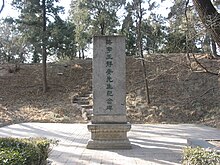-
(인문학) Wang Guowei사람되기/인문학 2016. 4. 19. 00:46
출처: https://en.wikipedia.org/wiki/Wang_Guowei
Wang Guowei
From Wikipedia, the free encyclopediaWang Guowei  The Monument of Wang Guowei in Tsinghua University
The Monument of Wang Guowei in Tsinghua UniversityBorn 2 December 1877
Haining, Zhejiang, Qing ChinaDied 2 June 1927 (aged 49)
Kunming Lake, Summer Palace,Beijing, ChinaCause of death Suicide by drowning Wang Guowei Traditional Chinese 王國維 Simplified Chinese 王国维 [show]Transcriptions Wang Guowei (Chinese: 王國維; 2 December 1877 – 2 June 1927), courtesy name Jing'an (靜安) or Boyu (伯隅), was a Chinese scholar, writer and poet. A versatile and original scholar, he made important contributions to the studies of ancient history, epigraphy, philology, vernacular literature and literary theory.
Contents
[hide]Biography[edit]
A native of Haining, Zhejiang, he went to Shanghai to work as a proofreader for a newspaper, after failing to pass the Imperial Examination in his hometown, at the age of 22. There he studied in the Dongwen Xueshe (東文學社), a Japanese languageteaching school, and became a protégé of Luo Zhenyu. Sponsored by Luo, he left for Japan in 1901, studying natural sciences inTokyo. Back in China one year later, he began to teach in different colleges, and devoted himself to the study of German idealism. He fled to Japan with Luo when the Xinhai Revolution took place in 1911. He returned to China in 1916, but remained loyal to the overthrown Manchu emperor. In 1924, he was appointed professor by the Tsinghua University, where he was known as one of the "Four Great Tutors," along with the prominent Chinese scholars Liang Qichao, Chen Yinke, and Y. R. Chao.
In 1927, Wang drowned himself in Kunming Lake in the Summer Palace before the revolutionary army entered Beijing.[1][2]
Chen Yinque's epitaph read: "The suicide of Wang was because he worried about losing the independent spirit and free thought he long cherished in his academic pursuit." [3]
Legacy[edit]
Wang focused on the studies of Chinese vernacular literature during the early year of his career. When he became convinced that Schopenhauer's metaphysics were not believable, he turned for solace to critical and philological studies of the novel Dream of the Red Chamber, as well as writing a concise history of the theaters of the Song andYuan dynasties.[4] Although its conclusions are controversial, his article on A Dream of the Red Chamber" has been called "a monumental development in the history of modern Chinese criticism." [5] Later he changed his academic direction, focusing on philology and ancient history. His works on ancient history and philology are collected inGuantang Jilin (觀堂集林).
References[edit]
- ^ Bonney, Joey (1986). Wang Kuo-wei: an intellectual biography. Harvard University Press. ISBN 0-674-94594-8.
- ^ Cheng, Zhongying; Nicholas Bunnin (2002). Contemporary Chinese Philosophy. Blackwell Publishers. p. 37. ISBN 0-631-21725-8.
- ^ "Humanities reborn at Tsinghua". China Daily. 2003-12-30. Archived from the original on June 9, 2013. Retrieved 16 April 2009.
- ^ Benjamin Schwartz, "Themes in intellectual history: May Fourth and After," Cambridge History of China Volume 12 Republican China 1912-1949 Pt 1 (Cambridge: Cambridge University Press, 1983), p. 418
- ^ Q.S. Tong and X. Zhou, "Criticism and Society: The Birth of the Modern Critical Subject in China," Boundary 2 29.1 (2002): 153-176. Hong Kong University Handle
External links[edit]
- (Chinese) Biography and bibliography
- (Chinese) Biography
- Works by Wang Guowei at Project Gutenberg
Authority control '사람되기 > 인문학' 카테고리의 다른 글
(인문학) 보도연맹 학살 (0) 2016.04.28 (인문학) 王国维 (0) 2016.04.19 (인문학) 왕궈웨이(1877-1927) (0) 2016.04.19 (인문학) 초대 대통령 이승만 박사 (0) 2016.04.08 (인문학) 2016년도 독서 목록 (0) 2016.04.08